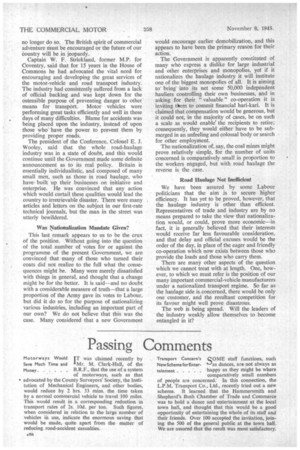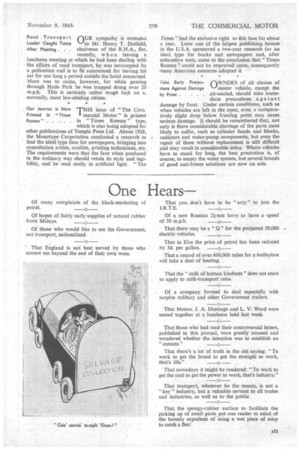Passing Comments
Page 22

Page 23

If you've noticed an error in this article please click here to report it so we can fix it.
Motorways Would IT was claimed recently by Save Much Time and IMr. M. Clark-Hall, of the Money B.R.F., that the use of a system of motorways, such as that advocated by the County Surveyors' Society, the Institution of Mechanical Engineers, and other bodies, would reduce by 2 hrs. 33 mins. the time taken by a normal commercial vehicle to travel 100 miles. This would result in a corresponding reduction in transport rates of 2s. 10d. per ton, Stith figures, when considered in relation to the large number of vehicles in use, indicate the enormous saving that would be made, quite apart from the matter of reducing road-accident casualties. Transport Concern's ROME staff functions, such NewSchemeforEnteras dances, are not always as tainment happy as they might be where comparatively small numbers of people are concerned.' In this connection, the L.P.M. Transport Co., Ltd., recently tried out a new scheme. It learned that the Hammersmith and Shepherd's. Bush Chamber of Trade and Commerce was to hold a dance and entertainment at the local town hall, and thought that this would be a good opportunity of entertaining the whole of its staff and their friends. Over 100 accepted the invitation, joining the 500 of the general public at the town hall. We are assured that the. result was most satisfactory. Road Transport Leader Caught Twice After Meeting . . OUR sympathy is extended to Mr. Henry T. Duffield, chairman of the R.H.A., for, recently, when leaving a luncheon meeting at which he had been dealing with the affairs of road transport, he was intercepted by a policeman and is to be summoned for leaving his car for too long a period outside the hotel concerned. More was to come, however, for while passing through Hyde Park he was trapped doing over 20 m.p.h. This is certainly rather tough luck on a, normally, most law-abiding citizen.
Our Journal is Now. THIS issue of "The Corn.
Printed in "Times 1 mereial Motor" is printed Roman" . . .. . . in "Times Roman" type, which is also being adopted for other publications of Temple Press Ltd. About 1928, the Monotype Corporation conducted a research to find the ideal type face for newspapers, bringing into consultation artists, oculists, printing technicians, etc. The requirements were that the face when produced in the ordinary way should retain its style and legibility, and be read easily in artificial light. "The Times " had the exclusive right to this face for about a year. Later one of the largest publishing houses in the U.S.A. sponsored a two-year research for an ideal type for books and newspapers and, after exhaustive tests, came to the conclusion that " Times Roman" could not be improved upon, consequently many American concerns adopted it.
lake Early Precau()INNERS of all classes of tions Against Damage "—"motor vehicle, except the by Frost air-cooled, should take imme diate precautions against damage by frost. .Under certain conditions, such as when vehicles are left in the open, even a comparatively slight drop below freezing point may cause serious damage. It should be remembered that, not only is there considerable shortage of the parts most likely to suffer, such as cylinder heads and blocks, radiators and water-pump components, but even the repair of these without replacement is still difficult and may result in considerable delay. Where vehicles have to stand for long, the best precaution is, of course, to empty the water system, but several brands of good anti-freeze solutions are now on sale.




























































